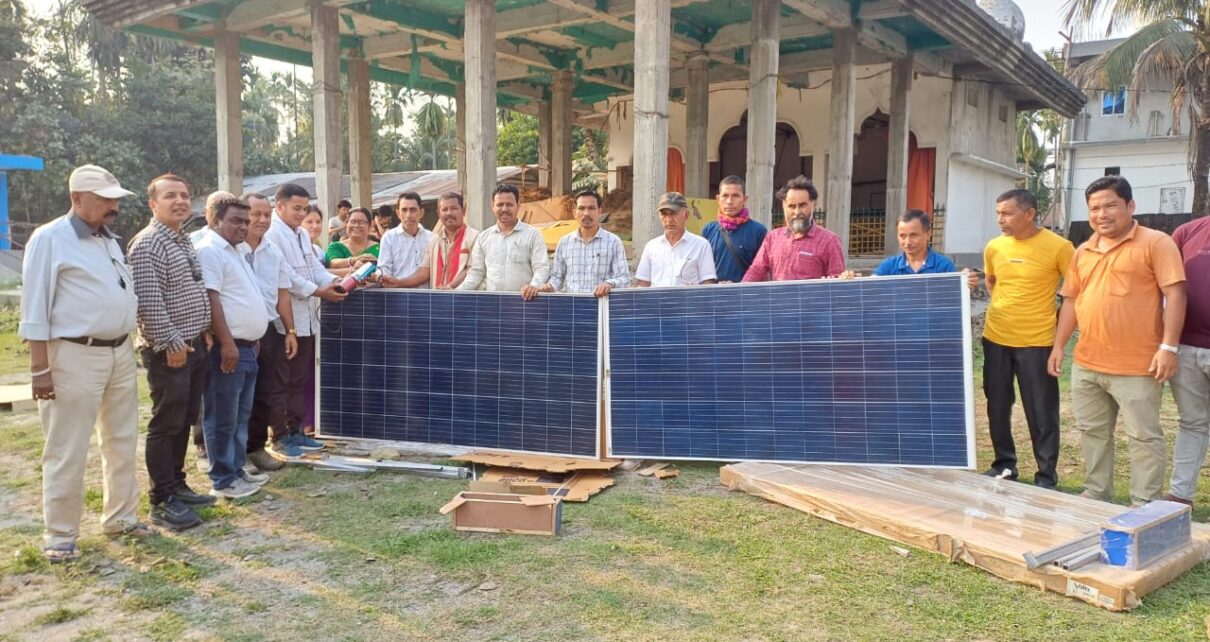Ahmedabad, April 21, 2025:As the world marks Earth Day 2025, HDFC Bank reaffirms its commitment to sustainable progress by announcing a significant milestone under its flagship CSR initiative, Parivartan. The Bank will enable access to clean and renewable energy solutions to over 1,000 villages across India by 2025—empowering rural and semi-urban communities through innovative solar-powered infrastructure, awareness, and local partnerships.

The Bank’s work in renewable energy aligns with this year’s Earth Day theme, Our Power, Our Planet, which calls for global acceleration of clean energy adoption. Under its pillar of Natural Resource Management, HDFC Bank Parivartan has installed over 61,655 solar streetlights across 22 states. It has also launched a range of solar initiatives that are enhancing rural life—from street safety to drinking water, farming, food processing and livelihood enhancement.

Recognising that infrastructure alone isnot enough, HDFC Bank has developed Solar Shiksha, an awareness initiative designed to demystify solar energy adoption in semi-urban India. Solar Shiksha addresses the lack of awareness, process barriers, and myths that often prevent adoption. The programme provides crucial education and practical demonstrations as well as information on government schemes and subsidies. By delivering educational materials in multiple regional languages, the program ensures accessibility and understanding across diverse communities
To date, over 90 awareness workshops have been held across states such as Goa, Karnataka, Haryana, Delhi, Jammu & Kashmir, Maharashtra, Telangana, and Chhattisgarh—impacting over 3,000 individuals across 450+ communities. The programme reaches schools, public hospitals, orphanages, farming groups and old-age homes—places where solar can directly improve quality of life. It promotes the adoption of a wide range of solar solutions, including solar pumps, panels, cookers, stoves, streetlights, and water heaters.
Speaking about its initiatives, Kaizad Bharucha, Deputy Managing Director, HDFC Bank, “At HDFC Bank, we believe that the path to a sustainable future lies in inclusive development. Our solar energy initiatives under Parivartan are designed to bring real, measurable change—lighting up streets and homes, while also creating opportunities. By focusing on awareness, innovation, and community ownership, we are investing in a future that is equitable, resilient and green. On Earth Day, we reaffirm our commitment to scaling up such impactful models across India.”
“We recognise that the democratisation of solar energy goes further than technological deployment,” saidNusrat Pathan, Head – CorporateSocial Responsibility at HDFC Bank. “Our commitment extends beyond infrastructure development, focusing on the creation of a knowledge-driven framework that enables long-term, community-led energy independence.”
Interventions in renewable energy across India
Some innovative solar projects include portable solar pumps for efficient irrigation, solar-powered piped water supply systems, solar-powered food processing units that boost local economies, and solar heaters in homestays to enhance tourism income sustainably. These projects showcase the versatility and transformative potential of solar energy in diverse applications across the country. Here are some examples:
In Raichur,Karnataka, solar streetlights have transformed pitch-dark roads into safer, navigable paths after sunset. As Huligudda, a beneficiary resident of Mattur village, shares: “Our elders and children feel secure now, and small vendors can work longer hours. These lights have brought comfort and livelihood support, even during power outages.” Like Karnataka, HDFC Bank Parivartan has installed over 61,655 solar streetlights across 22 states.
In the Palghar district of Maharashtra, the Bank partnered with CWAS and CRDF to install solar-powered mini piped water supply systems in the villages of Panshetpada and Jambhulichapada. Today, over 75 households have functional taps in their homes—reducing the burden on women and children who previously had to walk long distances to fetch water.
In Karraguda village, Andhra Pradesh, a solar-powered lift irrigation system supports agro-ecological farming throughout the year, helping reduce seasonal migration and diversify crops. In nearby Peramvandlapalli, a solar-driven bio-resource centre automates the preparation of organic farming inputs like Drava Jeevamrutham, promoting natural farming across 940 acres. Meanwhile, in Maniga village, a solar-powered energy cart provides affordable irrigation and post-harvest processing support to smallholder farmers. Operated collectively, it reduces dependency on diesel and boosts local incomes.
In the remote hamlet of Sobdar ki Basti in Barmer district of Rajasthan, a solar-powered water system draws drinking water from deep traditional Beri wells. The system has significantly alleviated water scarcity for over 880 villagers, enhancing resilience in this drought-prone region.
In Khedi in Madhya Pradesh, the women-led enterprise Shri Radha Enterprise uses solar energy to run multiple micro-units—including a bakery, grain mill, and cattle feed operation. This project demonstrates the powerful convergence of clean energy with women’s economic empowerment and self-reliance.
In Krishnagiri, Tamil Nadu, solar fencing around 340 acres of farmland has dramatically reduced crop losses caused by wild animals, making vegetable farming viable again for 241 farmers. Further south, in the Nilgiris and Coimbatore, solar pumps are helping rehabilitate degraded land and enable year-round farming in rainfed regions—raising yields by up to 30%. In places like Pillur and Masinagudi, terrain-specific solar irrigation systems are enabling over 20 families to cultivate high-value crops like bananas while cutting diesel use and improving climate resilience.
In Bheemraopally in Telangana, a farmer group has installed a shared solar irrigation system that has transformed 14 acres of rainfed land into fertile fields—tripling their income through crop diversification. In Nagaram village, Telengana, solar insect traps have helped reduce pesticide use by over 3,000 litres across 525 acres of chilli and vegetable farms—enhancing both productivity and health outcomes.
In the tea-growing regions of the North-East, solar panels supported by HDFC Bank are reducing electricity costs and carbon footprints, while improving safety and production reliability for plantation workers.
In the extreme climate of Ladakh, the Bank is supporting climate-adaptive solutions like passive solar greenhouses, solar-heated homestays, and apricot processing units powered -by solar dryers. These interventions are improving food security and boosting incomes in high-altitude, remote communities.
HDFC Bank Parivartan remains dedicated to building inclusive, resilient communities. On this Earth Day, the Bank invites all stakeholders to come together and unlock the full potential of Our Power, Our Planet.
To learn more about how HDFC Bank Parivartan is empowering communities through renewable energy education and adoption, visit the Solar Shiksha programme at https://v.hdfcbank.com/solarshiksha.html. Join us in lighting the way to a cleaner, greener future.





